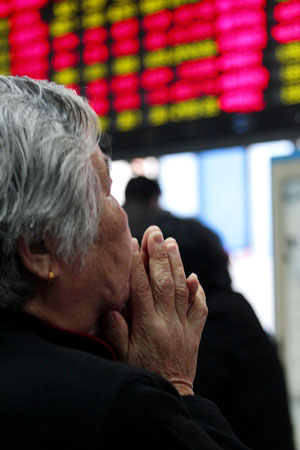-
News >Bizchina
Concerns over debt, rates spook investors
2010-12-01 12:54
An investor watches share price movements at a brokerage in Shanghai. China's stocks fell on Tuesday, sending the benchmark index to its first monthly drop since June. [Photo/China Daily]
Shanghai Composite Index in first monthly decline since June
SHANGHAI - China's stocks fell, sending the benchmark index to its first monthly drop since June.
The decline came on speculation the government will raise interest rates, and on concerns that the European debt crisis may spread and threaten the economic outlook.
Industrial and Commercial Bank of China Ltd paced losses for lenders after a Chinese Academy of Social Sciences economist said the government needs to boost borrowing costs by another 200 basis points.
Kweichow Moutai Co and Harbin Pharmaceutical Group led declines by consumer staples and drug stocks after the industry groups outperformed benchmark indexes this month and the government cut medicine prices to curb inflation.
"The government's tightening measures such as rate hikes may come faster than the market expects, as proved to be the case in some previous rounds," said Leo Gao, who helps oversee about $600 million at APS Asset Management Ltd in Shanghai. "The stock market will face downward pressure."
The Shanghai Composite Index dropped 1.61 percent, to close at 2820.18 on Tuesday. That capped a 5.3 percent decline this month, the first drop since June. The CSI 300 Index fell 1.66 percent to 3136.99.
The Shanghai gauge has lost 11 percent since reaching an almost seven-month high on Nov 8 after the government twice ordered banks to set aside larger reserves and raised interest rates in October to fight inflation.
The seven-day repurchase rate, which measures funding availability in the money market, climbed 63 basis points to 3.31 percent, the highest level since October 2008, according to a fixing rate published by the National Interbank Funding Center.
The government will hold an annual economic conference in Beijing late next week to set guidelines for monetary and fiscal policy in 2011, two people with knowledge of the matter said.
A gauge of consumer staples companies slid for the first time in nine days, losing 3.2 percent on Tuesday. The measure gained 10 percent this month, the most among the 10 industry groups.
Meanwhile, Harbin Pharmaceutical led declines for drugmakers, sliding 3.52 percent. The healthcare gauge has risen 4.5 percent this month, the second-best performance among groups.
China will cut the prices of 17 types of medicines including antibiotics and cardiovascular drugs starting Dec 12, the National Development and Reform Commission said on Tuesday.
Property developers fell after Moody's Investors Service said that it has a stable outlook for China's property sector, although a "moderate downward correction" is expected in prices during 2011.Emerging-market equity funds have taken in $84.3 billion this year, exceeding the record $83.3 billion received in 2009, according to the fund data and analysis provider, EPFR Global. China posted its largest weekly inflows since September in the week to Nov 24, it said.
"The liquidity-driven rally will likely carry on in the next six months," Citigroup Inc analysts led by Minggao Shen wrote in a note to clients. "We remain bullish on China."
Global stocks extended losses into a fourth week and the euro weakened as Ireland's 85 billion euro ($113 billion) bailout failed to ease concern the region's most-indebted nations will need further aid.
The Shanghai gauge has rebounded 19 percent since July 5, when it reached this year's low on expectations central banks around the world will inject more cash into their economies to boost growth. The index remains down 14 percent this year, Asia's worst-performing benchmark index, after the government tightened monetary policy and curbed lending growth to cool the economy.
Bloomberg News
